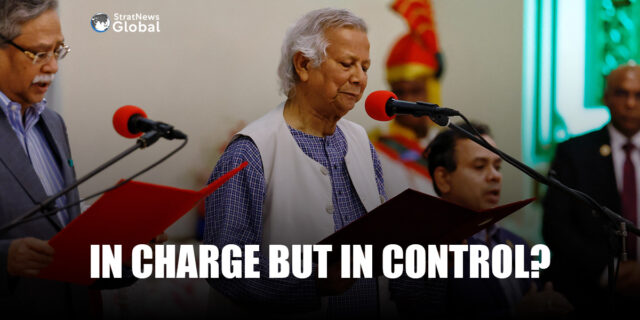An interim government headed by Nobel laureate Muhammad Yunus has taken charge in Bangladesh. While extending his best wishes, Prime Minister Narendra Modi says India remains committed to working with its neighbour. He also hoped the safety of Hindus and other minorities will be ensured.
Yunus, an economist, says restoring law and order is among his first priorities. There have been instances of attacks on Hindus and places of worship, which worries the Indian government.
Hindus Easy Targets In Bangladesh
Every time there’s a crisis in Bangladesh, Hindus are the first victims, the easiest targets, says former diplomat Pankaj Saran. Hindus in Bangladesh are the most vulnerable; they are dispossessed, Saran, a former envoy to Bangladesh, told StratNews Global. “They are the target of the right wing, whether the right wing belongs to the Awami League, the Jamaat and other Islamic parties.”
Saran says that’s just unacceptable, no matter what. “At the end of the day, they are first Bangladeshis and then Hindus. So you cannot justify your anger against India or Hasina by taking it out on the most defenceless on the bottom of your ladder.”
Role Of The Army
On the day Hasina quit and left the country, the Army stepped in to assure the people that an interim government will take over. It has projected itself as the custodian of public interest and people’s interests.
The Army is back in control and, given the circumstances, it is not a bad thing at all, says Pankaj Saran, who has been India’s deputy National Security Adviser. “You need to bring back law and order, and the Army is the last resort for this.”
Yunus And The Army
The Army has projected itself as a stabilising force in the immediate aftermath of Hasina’s exit. Saran expects that role to continue. Yunus will be heavily reliant on the army. “And my feeling is that they will give him maximum cooperation, to help the interim government, because that is the mood of the people today.”
Yunus’ Challenges
For now, Yunus has 16 advisors as colleagues. That includes politicians, former government officials, diplomats and student leaders about a quarter his age. He has appealed for calm as requested people to shun violence if the “freedom” has to be cherished. For now, many in Bangladesh are celebrating the end of the Hasina era. Once the euphoria dies down, it may be back to the ugly game of politics.
His (Yunus) problem will be as time goes by, when different elements and sections of society, including the political class, will make different demands on him, says Saran. “The BNP will definitely view this as an opportunity. So will the Jamaat and sections of civil society. So there will be different interests that will come into play.”
And good economics does not always make good politics.
Nitin A. Gokhale is a media entrepreneur, one of South Asia's leading strategic affairs analyst and author of over a dozen books so far on military history, insurgencies and wars.
Starting his career in journalism in 1983, he has since led teams of journalists across media platforms.
A specialist in conflict coverage, Gokhale has covered the insurgencies in India’s North-East, the 1999 Kargil conflict and Sri Lanka’s Eelam War IV between 2006-2009.
Gokhale now travels across the globe to speak at seminars and conferences, and lecture at India’s premier defence colleges. He has founded three niche portals, Bharatshakti.in, stratnewsglobal.com and Interstellar.news.





